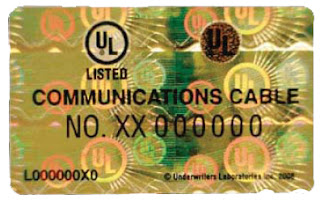Why should I buy anything other than counterfeit network cable, which is
cheaper? Yes, you can save money by using a low-grade cable on an installation,
but does it really translate in to savings or cost you more money in the long
run?
Let’s take a look at the evidence of time. It seems as if every time the
price of counterfeit copper or other cable components increases that a new wave
of fake/counterfeit products hits the market place. Once installed someone
eventually gets caught.
Datcom has been monitoring and reporting these incidences over the years
as these issues arise. Lately the frequency of occurrences has increased. We
have encountered products in June 07, April 09, Aug 10, Oct 10, and was reported
as a growing concern in the Feb 2011
reported in Cabling and Maintenance a popular industry magazine. Fast
forward to 2015 a we now have a whole association; CCCA in place to combat this insidious issue.
This problem has prompted UL
to integrated similar holographic technology used on credit cards to try
and stem the flow of this type of product. You can protect yourself and verify
products using the itunes Authenticator
App.
But
here are the real issues when the cable is always discovered:
1) Cables seldom
pass the standards.
2) Intermittent
problems occur resulting in unscheduled service calls.
3) If an
inspection is done it usually leads to a total re-install at the contractors
expense
4) Potential loss
of a client due to a perception of poor quality work.
5) Proliferation
of low quality products in the market place.
6) No point of
presence or local manufacturer support.
7) Zero product
constancy.
8) No
compensation when problems arise.
Most non-branded products are a scam
and are here today but gone tomorrow. If you have never heard of the brand
before, then rule of thumb says don't buy it no matter what the price.
End users are responsible for hiring
contractors that know what they are doing. Contractors are responsible for
dealing with distributors who are reliable, and distributors are responsible
for dealing with manufactures that stand behind their products. If all else
fails plug the UL number into the online directory and make sure the cable is
listed for use in the country of purchase and what regulations it meets. The bottom line
is that you get what you pay for & you should be buying from a reputable
distributor.
For more information on cable or other products call
1-800-427-2055.

No comments:
Post a Comment
Note: only a member of this blog may post a comment.